How To Watch The Darrell Brooks Case
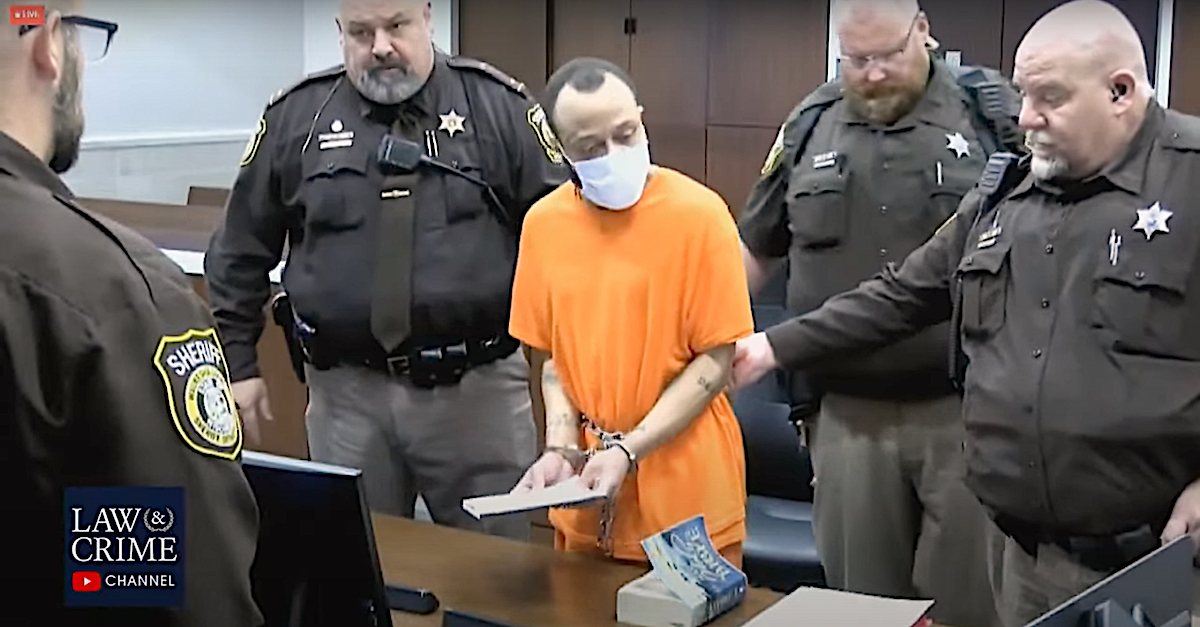
Darrell Brooks was led off to prison from a remote court after being sentenced. (Epitome via the Police force&Criminal offense YouTube aqueduct.)
Waukesha, Wisconsin holiday parade assailant Darrell Brooks will almost surely die in prison house after receiving multiple life sentences and additional terms of incarceration on a sum total of 76 dissever criminal charges.
Gauge Jennifer Dorow issued half-dozen consecutive — or back to back — life sentences with no possibility of extended supervision for each of the six victims of the Nov. 21, 2021 attack that left scores of others injured.
Dorow then issued 17.5 year sentences for attacks on a long list of other victims who survived. She issued 25-twelvemonth sentences (15 years backside confined plus ten years of extended supervision) on counts 68 through 73. Those sentences each were slated to run concurrent to the six life sentences.
Dorow and then sentenced Brooks to serve six years (three years behind bars plus iii years of extended supervision) on counts 74 and 75. They volition run consecutive to all other counts but concurrent to each other, the judge said.
Finally, Dorow sentenced Brooks to ix months behind bars — once again consecutive to any other sentence — for battery. That charge — the 76th and final count — was connected to an assail on his former girlfriend Erika Patterson. The approximate agreed with prosecutors that Brooks became enraged during an altercation involving Patterson and went on to mow downwards seven blocks of parade-goers on the same engagement.
"You lot deserve it," the gauge said afterward reading the sentences and reciting the names of all the victims.
She also ordered Brooks to accept no contact with any victims, no contact with Erika Patterson specifically, restitution of more $47,000 to an insurance company on behalf of the Waukesha Schoolhouse District, restitution of more than $124,000 to a criminal offense victim bounty programme, Deoxyribonucleic acid surcharges on all counts, a domestic abuse surcharge, and other courtroom costs.
Brooks heard the sentence from a remote court due to multiple outbursts earlier in the proceeding.
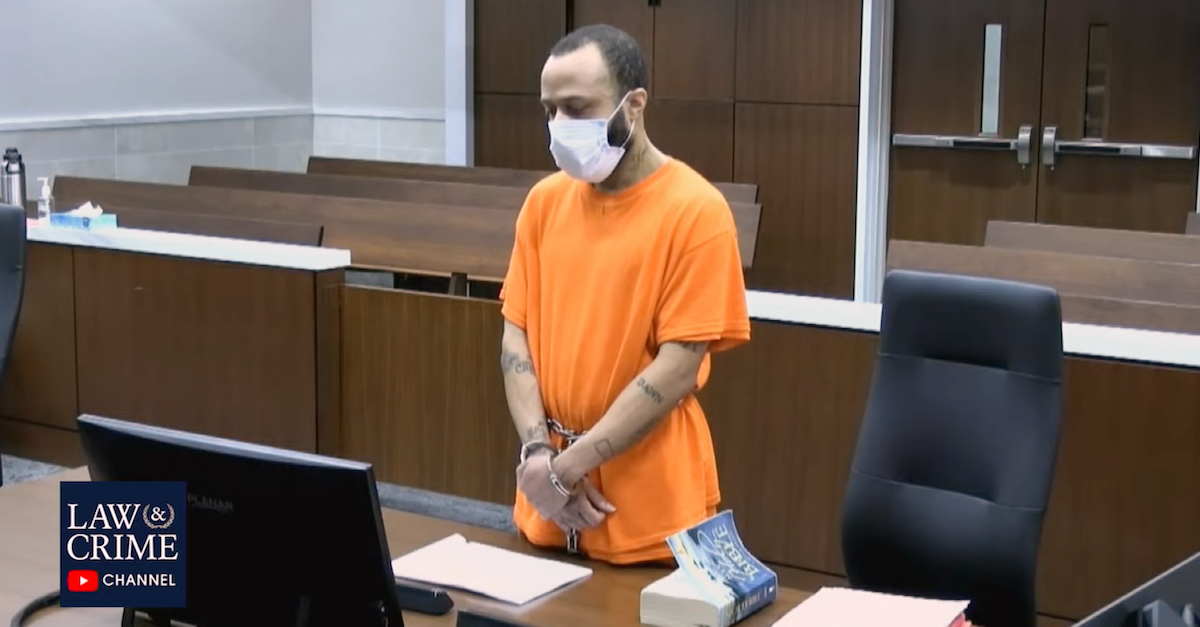
Darrell Brooks stood and watched his own sentence being read from another courtroom. (Prototype via the Law&Crime YouTube channel.)
Earlier issuing the judgement, Dorow spoke for more than an 60 minutes and asked Brooks rhetorically: "Why didn't you terminate?" She was referring to his decision to continue down the parade route injuring and killing people in his wake.
Dorow noted that Brooks drove three blocks "earlier hit anyone" and so engaged in five blocks of "chaos and carnage." She said the evidence showed that Brooks was driving between 33 and 34.five miles per hr at one point during the attack and an "boilerplate of 32 miles per hr" at some other indicate.
"Even though it took just a couple of minutes, there were so many opportunities for Mr. Brooks to but stop, plow effectually, plough down other streets," the judge said.
The gauge described the aftermath left backside on four of the blocks every bit resembling a "war zone."
At 4:37 p.m., a police officer first encountered Brooks, and the judge said Brooks had "aplenty time" to pass up several other streets before engaging in the attack on the parade road. Rather, Brooks drove straight into the crowds by taking a right-hand plow.
A police force officer pounded on the hood of Brooks' car, but Brooks didn't stop, the judge noted. He ignored barricades, parade floats, and continued through the crowds.
"In that location's no reasonable explanation other than: he was angry, he was full of rage, and he didn't care who he came into contact with, what he came in contact with, whether he drove past, through, at — he collection," the estimate said, citing evidence at trial.

Darrell Brooks waves a piece of paper from a remote courtroom subsequently being banished from Judge Dorow'southward courtroom. (Image via the Law&Crime YouTube channel.)
"It's hard not to recall about what I watched and not have this reaction," the judge said as she discussed video evidence of Brooks driving through the parade road and became emotional in the process. "Those are images that frankly kept me upwards at night that I saw over and over and over."
Dorow said a band managing director who testified about students and their formations that night was a "hero to me" for discussing her experiences on the record in court.
"This was driving over people," the judge said, underscoring other testimony.
The judge also pushed back at Brooks' slams against the commune attorney earlier in the proceeding, saying the DA was completely within her legal rights to present the case and her sentencing arguments as she indeed did.
At ane point, Brooks exploded in what the guess called a "tirade." The outburst was typical of his behavior throughout the trial. Later several admonishments to stand up down, Brooks connected; the guess removed him to a separate courtroom to watch the proceeding remotely.
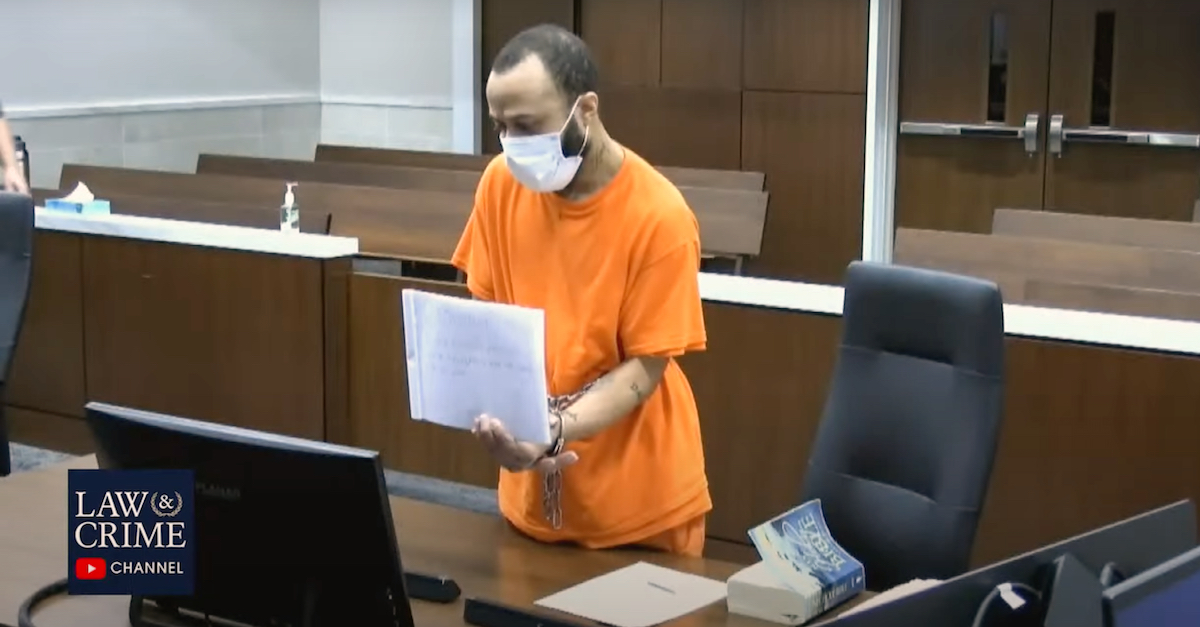
Darrell Brooks tries to go Judge Jennifer Dorow's attending from a remote courtroom later causing an flare-up in front of her. (Prototype via the Law&Criminal offence YouTube aqueduct.)
Brooks, from that remote courtroom, at times waved a piece of paper back and forth in front of a camera. At several points, a bailiff appeared to present Dorow with a notation from Brooks; the judge rejected information technology every bit bereft to ensure his participation in the proceeding without being a disruption.
Dorow noted that Brooks lied nigh being "thrown to the ground" when he was arrested. No force was used, the gauge said, citing video of the abort; rather, Brooks "cooperated" with the officers. Dorow said Brooks as well lied most why he was in Waukesha and who he was with.
The judge spent considerable fourth dimension lauding the victims' testimony and healing processes. She called out many by proper noun in a near two-hour speech earlier reading the sentence but regretted that she couldn't comment on each of them personally due to time constraints.
She did, however, expressly note that a child, Tucker Sparks, then age 12, told the court that he blamed himself for his 8-yr-old brother Jackson Sparks' death.
"It's not your fault, Tucker," the judge said, over again becoming emotional and holding back tears. "It'due south Mr. Brooks' fault."
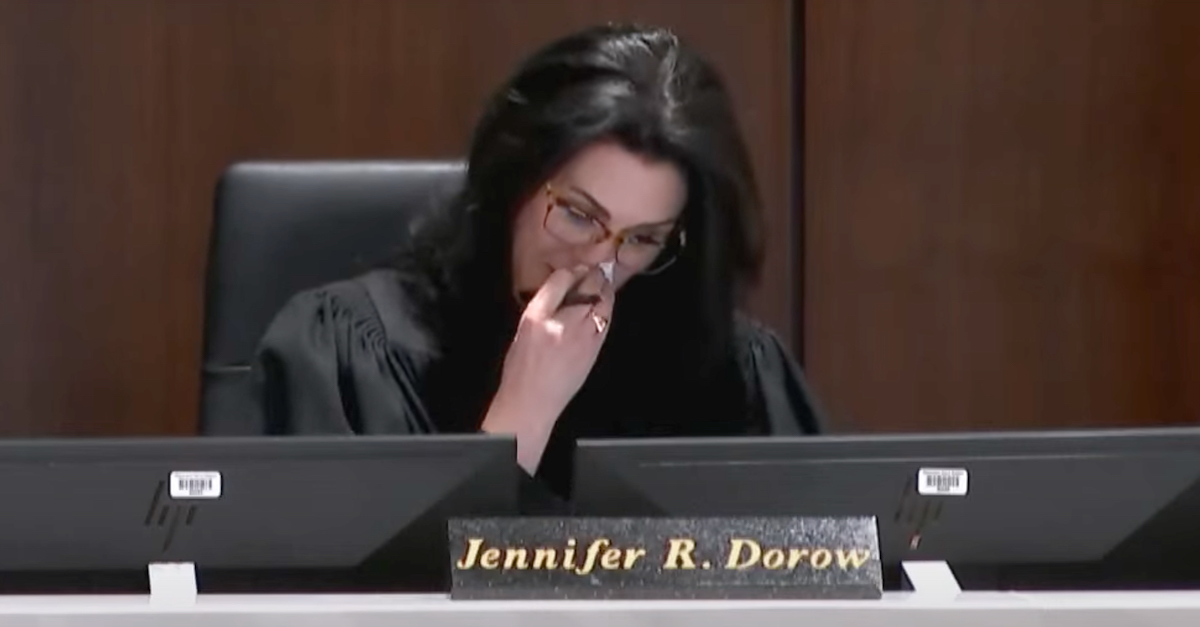
An emotional Judge Jennifer Dorow delivers remarks before sentencing Darrel Brooks. (Image via the Police&Criminal offense YouTube channel.)
Brooks, from the remote courtroom, endlessly attempted to describe the guess'south attending; when Dorow allowed Brooks to return, he continued to argue with her. The judge again removed him from the court and accused him of attempting to delay his inevitable sentencing.
Mental Wellness Concerns
Judge Dorow kicked off her portion of the sentencing proceeding by spending considerable fourth dimension rubbishing Brooks' mental wellness excuses for what occurred.
"Mental wellness issues did not cause him to do what he did . . . and frankly did not play any role," Dorow concluded.
Brooks initially entered a plea of not guilty by reason of mental disease or defect, but four "well-known doctors" studied Brooks, the estimate said. Four commensurate reports were 24, eight, 26, and 12 pages long, respectively, the judge continued, and they incorporated comments from previous mental health treatments.
One of those report said Brooks was "indifferent," "rationalizing," and had a "history of disregarding the rights of others," the judge said from the demote.
The experts suggested that Brooks' mental affliction or defect plea was not right and could not be used at trial, Dorow repeated.
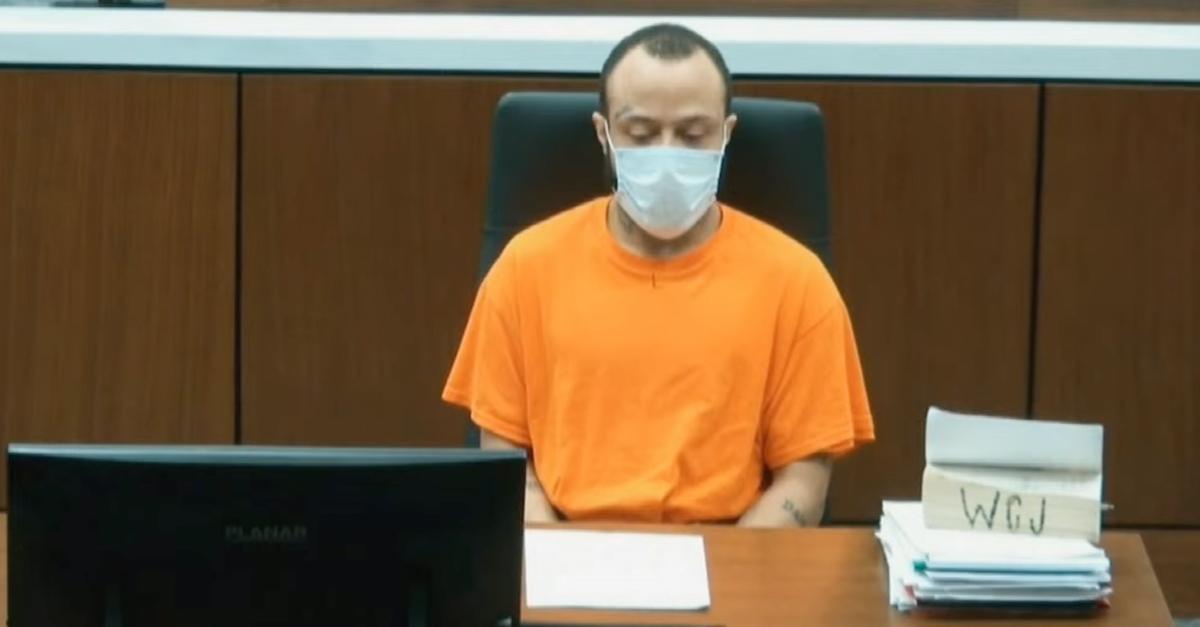
Darrell Brooks. (Image via the Law&Crime YouTube channel.)
The legal defense of insanity is different — and involves a more narrow question — than the broader medical inquiry of mental illness and mental health. While a defendant may have received a medical mental health diagnosis and/or treatment, the legal question is separate and, in general, forces the court to look at whether a defendant's mental state shows evidence of criminal culpability. Four states do non recognize traditional insanity defenses. The remaining states generally utilize one of four legal tests to determine whether a accused is legally insane; nevertheless, of those four tests, two are by far the well-nigh common. In Wisconsin, the inquiry goes like this:
A person is not responsible for criminal conduct if at the fourth dimension of such behave as a result of mental illness or defect the person lacked substantial capacity either to capeesh the wrongfulness of his or her conduct or conform his or her comport to the requirements of law.
Judge Dorow, citing one of the same assessments of Brooks, said the mass killing in Waukesha happened when the defendant'due south' "underlying . . . anger and range, borne of his conflict with his girlfriend" caused him to lash out.
Brooks' conduct was not the event of any underlying mental health issues, the report continued. It noted that Brooks' prior conduct was controlled, and Brooks tried to cover his tracks after he fled the attack, Dorow indicated.
In other words, Brooks could "control or suit his conduct to the requirements of the law" and appreciated (as evidenced by the coverup) that his deportment were wrong, Dorow concluded. Therefore, he had no reason to "terrorize" parade-goers, the estimate said.
Again reading from reports, Dorow said Brooks exhibited a "failure to program alee for irritability or aggressiveness" and rationalized pain others — signs of "antisocial personality disorder."
Still that diagnosis, the experts ended, did non touch Brooks' ability to conform his carry with the requirements of the law.
"None of that acquired yous to do what you lot did on Nov. 21, 2021," the judge again concluded.
Dorow said a "crisis of the mentally sick" had befallen the courts merely that the legal standard necessary for an insanity defense was not met by Brooks. She recalled other defendants who suffered from hallucinations and legitimate mental illnesses appearing in her courtroom in the past.
"It'due south a very, very different presentation," she said, comparing those cases with his.
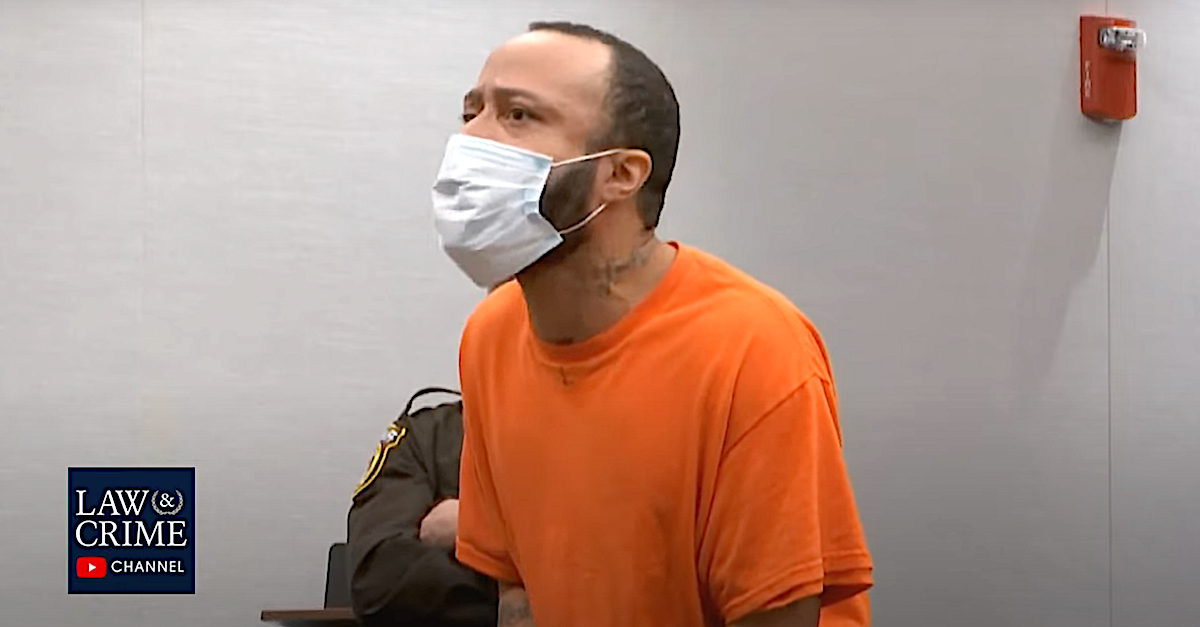
Darrell Brooks argues with Gauge Jennifer Dorow before being removed from her courtroom for a second fourth dimension prior to his sentence. (Image via the Law&Law-breaking YouTube aqueduct.)
"Good people do bad things, but in that location are times when evil people practice bad things," Dorow continued. "There is no medication or treatment for a heart that is aptitude on evil."
The judge said a bad childhood or other traumas did not cause Brooks to attack the parade-goers in 2021.
"He is fueled by acrimony and rage," Dorow said. "Mr. Brooks, you lot are one of such persons."
Indeed, the gauge said Brooks at times fabricated "sophisticated" arguments and objections while representing himself at trial — once more bear witness that Brooks had the mental chapters to conform his conduct with the requirements of the constabulary.
The gauge as well reminded Brooks that information technology was likely easier for his family to arraign or "cling" to mental illness as an excuse for what happened than it was for his relatives to come up to grips with his conduct.
She said his treatment backside confined would exist up to the Department of Corrections.
Sentencing
"Today I am tasked with sentencing Darrell Brooks for 76 counts related to a couple of moments in time," the gauge said before passing judgement. She said her sentence was continued to Brooks' conduct on Nov. 21, 2021, and not his bear during his trial. (She said she was technically able to take the latter into account simply chose not to.)
Disagreeing with Brooks' claims that the incident was not an "set on," Dorow said what happened at the parade was, indeed, best summed upwards by using that word.
She said Brooks "boiled over" with "rage and acrimony" during a previous incident and barreled toward the parade route.
The euphemisms about the attack — "viciousness, the speed, the swerving" — flowed freely from the demote as the hearing continued.
"It was clear who did this," the judge said. "The land had overwhelming show of Mr. Brooks' guilt."
The defendant's "complete and utter lack of remorse" was also stunning, the approximate said.
She noted that Brooks spoke for ii hours prior to sentencing and simply provided 1 sentence to suggest he might exist sorry. She further noted that Brooks mocked the victims "with manus gestures" and by "rolling his eyes" when it was their plough to speak during Tuesday's portion of the 2-mean solar day sentencing hearing.
"That is not a sign of someone who has empathy — who is sorry for what he has washed," the guess ascertained.
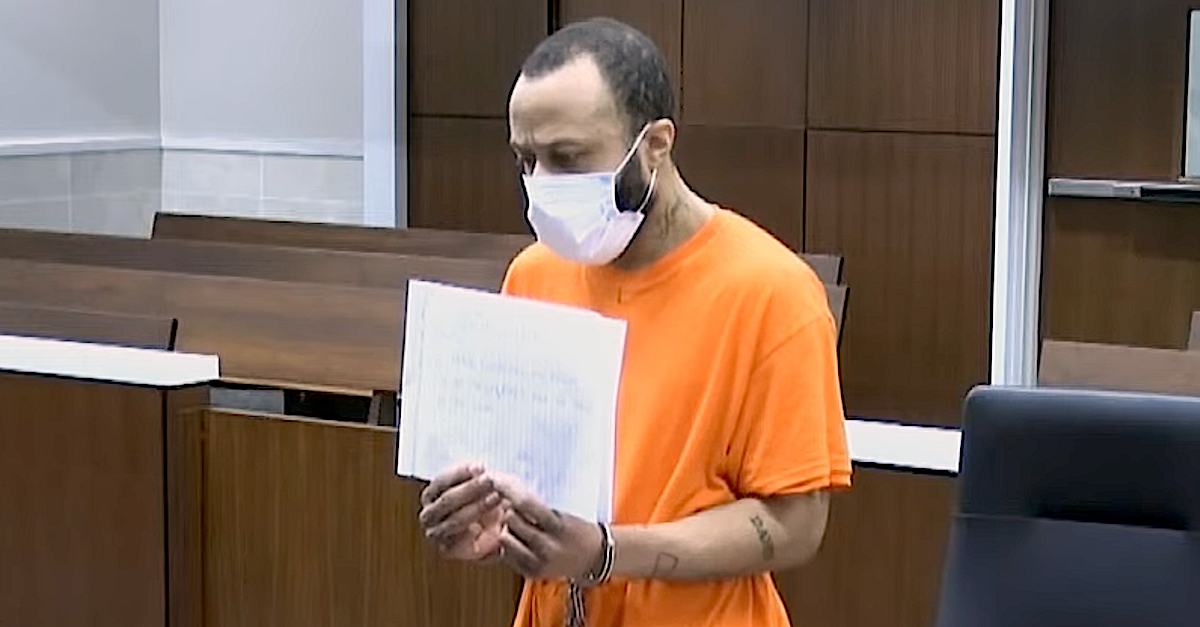
Darrell Brooks over again tries to go Judge Jennifer Dorow'southward attention from a remote courtroom afterward causing an burst in forepart of her. (Epitome via the Law&Crime YouTube channel.)
The gauge said she struggled to find mitigating factors simply found a number of aggravating factors that contributed to the serious sentence.
She noted that Brooks attempted to alter his appearance and fled the scene of the attack — incidents she called clear and ultimate examples of consciousness of guilt.
And, she said, the incident happened when Brooks was out on bond: "the rules mean nothing to Mr. Brooks . . . he didn't care."
Jail phone calls showed Brooks berating and threatening the life of his ex-girlfriend, Erika Patterson, the guess noted. A confrontation with Patterson threw Brooks into a fit of rage that led to the parade attack, the judge ascertained. Dorow said two other friends likely saved Patterson'southward life. But Brooks' rage was so severe that it left six others dead and many others maimed.
Dorow indicated that the jail calls were more than evidence of Brooks' "poor moral character."
The judge so noted Brooks' criminal history across multiple states and reiterated that there was no bear witness he was suffering from a mental health crunch that would take negated his criminal culpability.
"Mr. Brooks talked virtually at times this being the 'will of God' or that 'all things happen for a reason.' I'k here to tell you, Mr. Brooks: yous are not an instrumentality of God," Dorow continued. "Death might be inevitable to all of us, but you lot cut the lives of vi individuals short. You — you solitary, Mr. Brooks, cut the lives of these half-dozen, innocent people brusk."
Dorow chosen Brooks "deliberate," "intelligent" (in a nefarious way), and "purposeful" — and said the community needed to be protected from his fits of rage.
"The customs is non safe from your violent and criminal bear unless you are in custody," Dorow continued.
The judge then delivered the sentence and said Brooks used his vehicle every bit a "battering ram."
Wednesday's full sentencing hearing is here:
Take a tip we should know? [email protected]
Source: https://lawandcrime.com/live-trials/live-trials-current/waukesha-parade-tragedy/you-are-not-an-instrumentality-of-god-judge-dismisses-darrell-brooks-mental-health-claims-sends-waukesha-parade-killer-to-die-in-prison/

0 Response to "How To Watch The Darrell Brooks Case"
Post a Comment